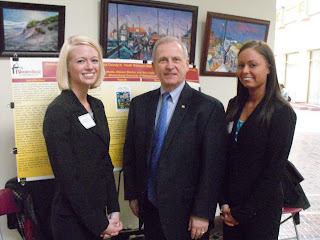Of course, the real value of a college education is only partly linked to the salary a graduate is likely to be offered immediately upon graduation. If you disagree, I would respectfully observe that today is Pennsylvania's primary election and that the very concept of democracy relies upon the responsible behavior of an educated and engaged populace. For this purpose I do not equate "educated" with "college-educated," but I think that the critical thinking skills and global perspectives students gain in pursuit of bachelor's degrees ought to matter in the democratic process, and at any rate they have plenty of value aside from increased earning power.
Still, increased earning power ... that's pretty important, right? Sure it is! Check out this recent USA Today article that argues that the skills and values most directly associated with the liberal arts are indeed directly related to increased earning power. It's predicted that today's graduates will change careers half a dozen times or more. The liberal arts prepare students for all of their jobs, not just the first one.
The Today spot does make two important points, though. First, canny liberal arts students can do a lot to maximize their employment opportunities through choices about second majors, minors, study abroad opportunities, internships, and other strategies. There are many ways to move a résumé to the top of the pile on a manager's desk. Second, students and their families must carefully consider the impact of debt--student loan debt as well as auto loan and credit card debt--on their quality of life in the present and the long-term future.
This is good advice. If your passion or your career goals lead you to study the humanities, arts, or social sciences, do so--and do it with your eyes wide open to the myriad opportunities to maximize your potential for gainful employment upon graduation, whether your major is philosophy or criminal justice. And if you want to keep your post-graduate debt to a minimum (who doesn't?), public higher education is still your best value.
James S. Brown
Dean
Still, increased earning power ... that's pretty important, right? Sure it is! Check out this recent USA Today article that argues that the skills and values most directly associated with the liberal arts are indeed directly related to increased earning power. It's predicted that today's graduates will change careers half a dozen times or more. The liberal arts prepare students for all of their jobs, not just the first one.
The Today spot does make two important points, though. First, canny liberal arts students can do a lot to maximize their employment opportunities through choices about second majors, minors, study abroad opportunities, internships, and other strategies. There are many ways to move a résumé to the top of the pile on a manager's desk. Second, students and their families must carefully consider the impact of debt--student loan debt as well as auto loan and credit card debt--on their quality of life in the present and the long-term future.
This is good advice. If your passion or your career goals lead you to study the humanities, arts, or social sciences, do so--and do it with your eyes wide open to the myriad opportunities to maximize your potential for gainful employment upon graduation, whether your major is philosophy or criminal justice. And if you want to keep your post-graduate debt to a minimum (who doesn't?), public higher education is still your best value.
James S. Brown
Dean














